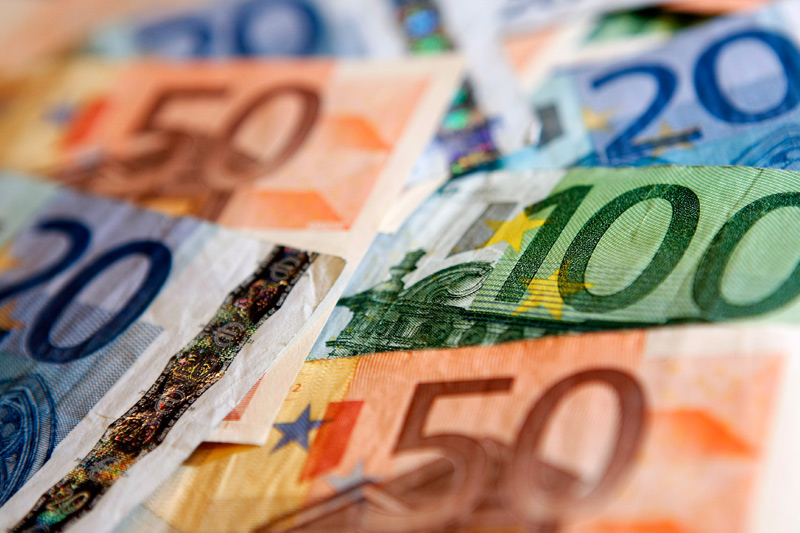Investing.com - The euro advanced to multi-week highs against the U.S. dollar and the yen on Tuesday, boosted by hopes that the European Central Bank will soon act to lower Spanish and Italian borrowing costs and stem the debt crisis in the euro zone.
During European late morning trade, the euro rose to a two-week high against the U.S. dollar, with EUR/USD climbing 0.64% to 1.2423.
Earlier Tuesday, the U.K.’s Telegraph newspaper said it could confirm weekend reports that the ECB may set a cap on peripheral euro zone bond yields at its next policy meeting in September.
On Monday, the ECB dismissed the reports, saying it was “misleading” to report on decisions which have not yet been taken.
Speculation over the possibility of ECB intervention saw Spanish borrowing costs fall at an auction of short-term government debt, with Madrid successful auctioning EUR4.5 billion of bills, the top end of the target range.
Meanwhile, investors were looking ahead to a series of euro zone meetings later in the week, amid hopes that leaders would make some progress on steps to the stem the crisis in the region.
Luxemburg’s Prime Minister Jean-Claude Juncker, who also heads the group of euro zone finance ministers, was to hold talks with Greek Prime Minister Antonis Samaras on Wednesday, to discuss a two-year extension of the country’s economic reform program.
German Chancellor Angela Merkel was to meet with French President Francois Hollande on Thursday, while Antonis Samaras was to meet with the French and German leaders later in the week.
The single currency was also higher against the pound, with EUR/GBP rising 0.27% to 0.7878.
In the U.K., official data showed that public sector borrowing rose unexpectedly in July, fuelling concerns over the state of public finances.
The National Statistics Office said that public sector net borrowing posted a surplus of GBP1.8 billion in July, compared to a deficit of GBP12.2 billion in June and disappointing expectations for a surplus of GBP2.5 billion.
The euro hit a six-week against the yen, with EUR/JPY up 0.63% to 98.65 and remained steady against the Swiss franc, with EUR/CHF dipping 0.01% to 1.2009.
The shared currency was mixed against the Australian, Canadian and New Zealand dollars, with EUR/AUD inching down 0.05% to 1.1812, EUR/CAD gaining 0.31% to trade at 1.2239 and EUR/NZD dipping 0.03% to 1.5258.
The minutes of the Reserve Bank of Australia’s August policy meeting showed that policymakers did not consider a rate cut this month, as domestic economic growth overshadowed the “fragile” global outlook.
Trade looked likely to remain quiet on Tuesday, with no significant economic data releases on the calendar, while volumes were thin with many market participants on summer holidays.
During European late morning trade, the euro rose to a two-week high against the U.S. dollar, with EUR/USD climbing 0.64% to 1.2423.
Earlier Tuesday, the U.K.’s Telegraph newspaper said it could confirm weekend reports that the ECB may set a cap on peripheral euro zone bond yields at its next policy meeting in September.
On Monday, the ECB dismissed the reports, saying it was “misleading” to report on decisions which have not yet been taken.
Speculation over the possibility of ECB intervention saw Spanish borrowing costs fall at an auction of short-term government debt, with Madrid successful auctioning EUR4.5 billion of bills, the top end of the target range.
Meanwhile, investors were looking ahead to a series of euro zone meetings later in the week, amid hopes that leaders would make some progress on steps to the stem the crisis in the region.
Luxemburg’s Prime Minister Jean-Claude Juncker, who also heads the group of euro zone finance ministers, was to hold talks with Greek Prime Minister Antonis Samaras on Wednesday, to discuss a two-year extension of the country’s economic reform program.
German Chancellor Angela Merkel was to meet with French President Francois Hollande on Thursday, while Antonis Samaras was to meet with the French and German leaders later in the week.
The single currency was also higher against the pound, with EUR/GBP rising 0.27% to 0.7878.
In the U.K., official data showed that public sector borrowing rose unexpectedly in July, fuelling concerns over the state of public finances.
The National Statistics Office said that public sector net borrowing posted a surplus of GBP1.8 billion in July, compared to a deficit of GBP12.2 billion in June and disappointing expectations for a surplus of GBP2.5 billion.
The euro hit a six-week against the yen, with EUR/JPY up 0.63% to 98.65 and remained steady against the Swiss franc, with EUR/CHF dipping 0.01% to 1.2009.
The shared currency was mixed against the Australian, Canadian and New Zealand dollars, with EUR/AUD inching down 0.05% to 1.1812, EUR/CAD gaining 0.31% to trade at 1.2239 and EUR/NZD dipping 0.03% to 1.5258.
The minutes of the Reserve Bank of Australia’s August policy meeting showed that policymakers did not consider a rate cut this month, as domestic economic growth overshadowed the “fragile” global outlook.
Trade looked likely to remain quiet on Tuesday, with no significant economic data releases on the calendar, while volumes were thin with many market participants on summer holidays.
